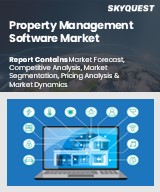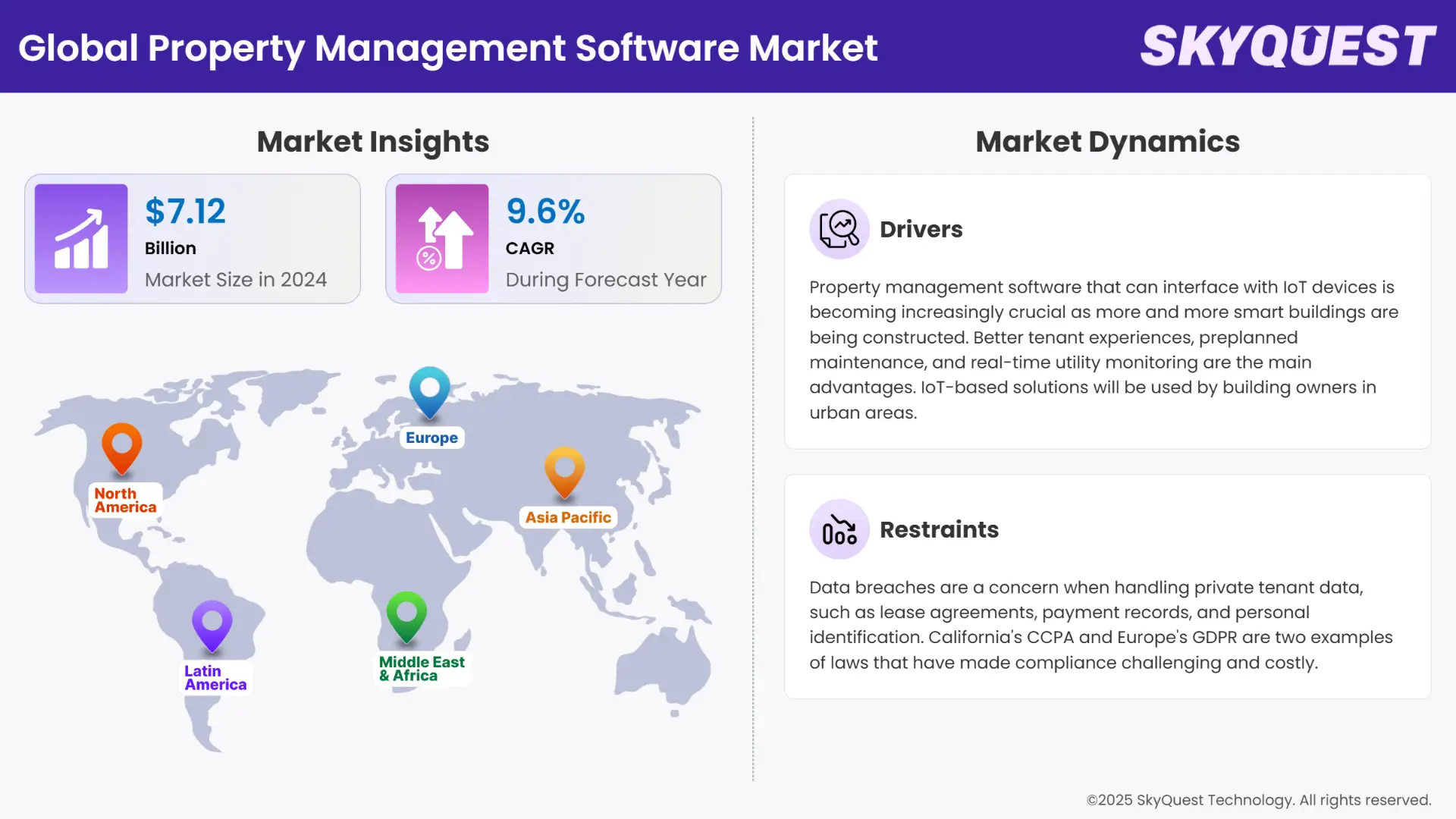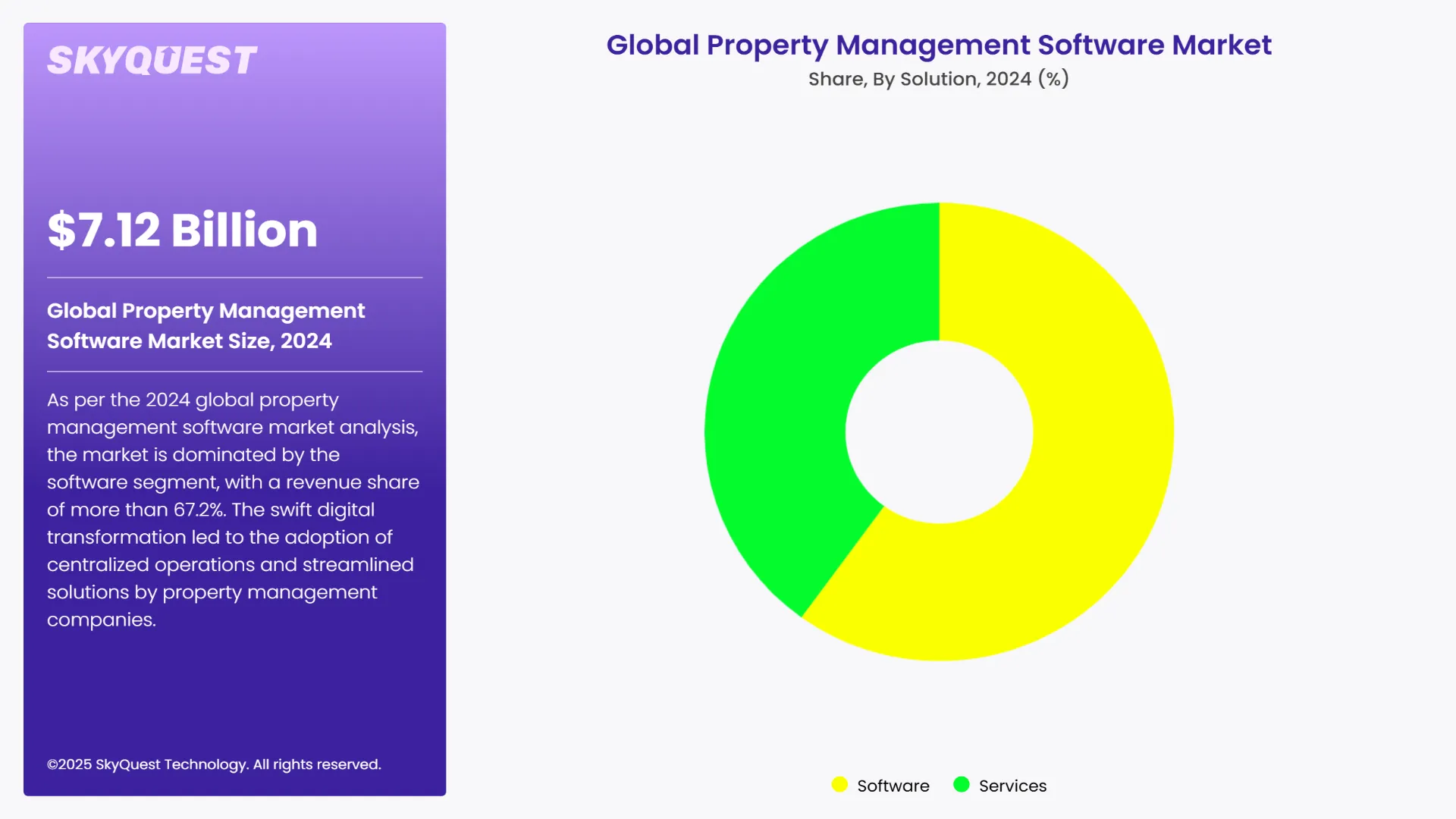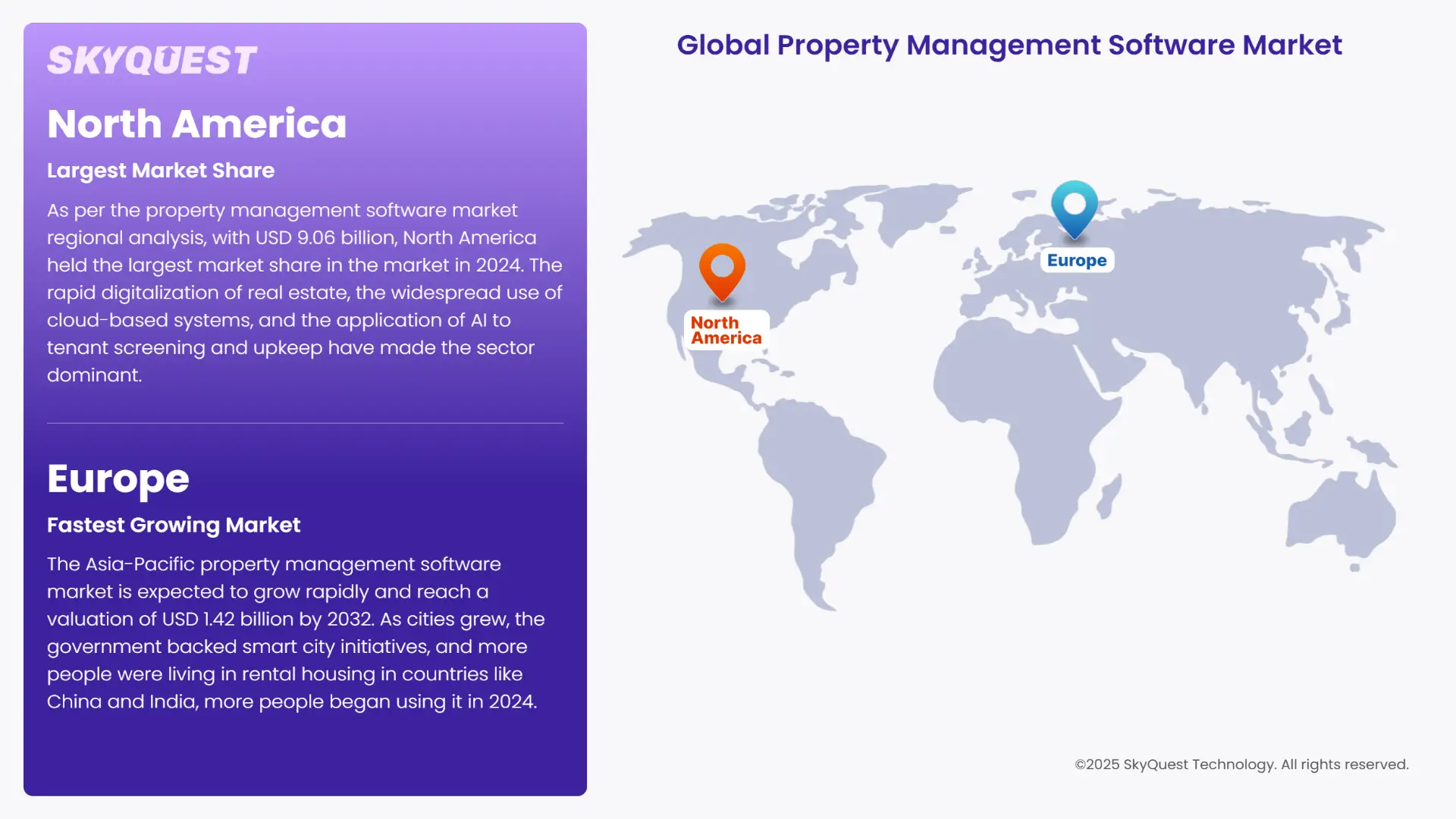
Report ID: SQMIG45E2206

Report ID: SQMIG45E2206
sales@skyquestt.com
USA +1 351-333-4748

Report ID:
SQMIG45E2206 |
Region:
Global |
Published Date: December, 2025
Pages:
191
|Tables:
114
|Figures:
71



Global Property Management Software Market size was valued at USD 5.88 Billion in 2024 and is poised to grow from USD 6.4 Billion in 2025 to USD 12.56 Billion by 2033, growing at a CAGR of 8.8% during the forecast period (2026–2033).
The growing demand for property management software to meet the real estate preferences of consumers and the increasing need for improved customer service and support are driving the global property management software market growth.
In addition, the global property management software industry is expanding due to a number of factors, including the rapid adoption of cloud computing solutions, the increasing use of digitalization, and reliance on software-as-a-service (SaaS) platforms. The market is also benefiting from the growth of smart real estate infrastructure and the propensity to use a single platform for multiple uses.
Can AI-Powered Tools Solve the Biggest Challenges in Property Management?
By automating tasks, improving the lives of tenants, and increasing operational efficiency, artificial intelligence (AI) is revolutionizing the property management software market outlook. Platforms will use AI more and more in 2024 and 2025 for chatbots, lease management, maintenance demand forecasting, and price adjustments. Artificial intelligence (AI) algorithms can be used by landlords to determine when maintenance is due, set rent rates according to market demand, and offer renters round-the-clock virtual assistance.

To get more insights on this market click here to Request a Free Sample Report
The global property management market is segmented into deployment, solution, application, end use, and region. By deployment, the market is bifurcated into clouds and on-premises. According to the solution, it is divided into software and services. Depending on the application, the market is classified into residential and commercial sectors. As per end use, it is categorized into housing associations, property managers/agents, and property investors. Regionally, it is analyzed across North America, Europe, Asia-Pacific, Latin America, and the Middle East and Africa.
As per the 2024 global property management software market analysis, the market is dominated by the software segment, with a revenue share of more than 67.2%. The swift digital transformation led to the adoption of centralized operations and streamlined solutions by property management companies. Robust software platforms that provide automation, data analytics, and remote access capabilities are essential due to the increasing complexity of property management. Another factor propelling this growth is property managers' awareness of the competitive advantages of software, which encourages investments to enhance resource allocation, occupancy rates, and tenant experiences.
The services segment is expected to grow at the fastest CAGR of 9.5% during the forecast period. This is due to the fact that managing complex property tasks requires an increasing amount of specialized knowledge. By offering specialized solutions for marketing, tenant relations, legal compliance, and strategic planning, service providers tackle the intricate nature of property management. In addition to providing industry insights and a human touch, this sector improves software platforms through customization, customer support, and training, all of which significantly contribute to its remarkable growth.
Based on the 2024 global property management software market forecast, the residential segment is expected to continue to hold its dominant position throughout the forecast period, with the largest market share of 65.6%. The primary drivers of the residential segment's dominance are growing real estate investments and the growing demand for rental properties. Trends in urbanization and changing lifestyle choices have led to a sharp rise in the number of people opting to rent rather than buy homes. This trend is especially felt by younger generations, who place a higher value on flexibility and are less inclined to commit to long-term homeownership. The need for effective property management systems rises as a result of the increase in rental properties. The residential segment includes single-family housing, multi-family housing/apartments, and other sub-segments.
The commercial segment is expected to grow at the fastest CAGR of 9.6% during the forecast period. The growing global commercial sector is one of the primary forces behind market demand. Increasing disposable income, evolving consumption technologies, and growing cyber risk management are other factors that are expected to spur investments in the commercial sector and drive the growth of the market. Hotels, offices, and retail establishments are just a few of the sub-segments that make up the commercial segment. PMS has become an essential tool in the hotel management industry. By controlling the interface between several departments, it makes it easier to manage a hotel's estate or land effectively.

To get detailed segments analysis, Request a Free Sample Report
As per the property management software market regional analysis, with USD 9.06 billion, North America held the largest market share in the market in 2024. The rapid digitalization of real estate, the widespread use of cloud-based systems, and the application of AI to tenant screening and upkeep have made the sector dominant. North American companies are investing heavily in scalable, centralized platforms for lease monitoring, utility billing, and real-time analytics as portfolios of multi-family and commercial properties grow, particularly in urban areas.
The U.S. property management software sector reached USD 1.60 billion in 2024 due to the automation of lease operations, the growth of multi-family housing, and the use of tenant engagement technologies by landlords. The legal focus on algorithmic pricing in 2024 (such as the RealPage case) has caused many organizations to prioritize transparency and compliance. To improve efficiency, major suppliers are growing their API-based ecosystems. In the US, tech-friendly laws also benefit cities by facilitating faster platform upgrades for the rental industry as a whole.
In 2024, the property management software market in Canada is estimated to be worth USD 1.09 billion. The nation's advancements in digital infrastructure, smart building projects, and an increase in the demand for rental properties are all contributing to growth. Cloud-based technologies that provide automated maintenance, energy-use data, and mobile interfaces are being used by Canadian businesses. Since the government is funding affordable housing projects and ESG compliance is a priority, property managers in both urban and rural areas are increasingly implementing technology.
The Asia-Pacific property management software market is expected to grow rapidly and reach a valuation of USD 1.42 billion by 2032. As cities grew, the government backed smart city initiatives, and more people were living in rental housing in countries like China and India, more people began using it in 2024. AI is being used by property owners to schedule maintenance and offer mobile-first tenant communication solutions. APAC's transition to cloud-based management systems is accelerating due to the growth of the middle class and the pervasiveness of digital payments.
The Chinese property management software industry is expanding dramatically due to investments in smart cities and improvements in people's lifestyles. In 2024, the market is predicted to be worth USD 330 million. IoT connections, AI-based tenant analytics, and facial recognition are some of the smart systems being used by Chinese real estate firms. The government's emphasis on digital urban governance and the expansion of rental housing are forcing local suppliers to develop compliance solutions and real-time dashboards specifically designed for high-density urban areas.
In 2024, the Japanese property management software market is valued at about USD 260 million. Property managers are using automation solutions as a result of the aging population and the high demand for rental units in urban areas. Cloud-based platforms that manage maintenance, lease renewals, and tenant paperwork are beginning to appeal to people. Long-term operational sustainability in both residential and commercial portfolios became a greater concern for property owners in 2025. Software with ESG indicators and smart building compliance features became more in demand as a result.
With a 2024 valuation of USD 5.92 billion, Europe remains a major player in the global economy. The region's emphasis on energy efficiency, sustainability, and adherence to regulations (such as GDPR) is increasing the use of software. The best cloud platforms are those that allow tenants to use smart meters, create their own portals, and obtain green certifications. Platform use for managing both residential and commercial assets is becoming more widespread as a result of cross-border real estate investments and digital transformation throughout EU nations.
In 2024, the UK market is worth USD 670 million. The use of property management software is being driven by the increase in smart city initiatives, build-to-rent projects, and rental demand. AI-powered solutions are beginning to be used by British businesses to forecast rent and manage portfolio risk. Small and mid-sized property owners are also being encouraged to use cloud-based software for tasks like tracking leases, automating billing, and interacting with tenants through government-backed digital infrastructure projects.
In 2024, the French property management software market is valued at USD 520 million. Businesses are using smart software solutions that can do both regulatory reporting and smart building integration because of the government's Industry 4.0 and energy-efficiency incentives. To reduce operating costs for residential, hotel, and mixed-use real estate assets, property managers in France are concentrating on automating lease agreements, preventative maintenance, and tenant interactions through mobile applications.
The Italy property management software market is valued at USD 410 million in 2024 due to increased investment in short-term rentals and tourism-focused real estate portfolios. Landlords are beginning to move to digital as more people use software in cities like Rome and Milan. Italian property managers are concentrating on multilingual platforms, automated maintenance requests, and tools for remote inspections to increase efficiency and attract foreign renters in the residential and commercial real estate markets.

To know more about the market opportunities by region and country, click here to
Buy The Complete Report
Expansion of IoT Integration and Smart Building Technology
Growing Demand for Centralized Management
Issues with Data Security and Privacy
Expensive Initial Setup and Training Expenses
Request Free Customization of this report to help us to meet your business objectives.
The global property management software market is highly competitive and dynamic. Buildium, Yardi, and AppFolio are all working on industry-specific modules, improving the mobile compatibility of their apps, and incorporating artificial intelligence. As bigger companies buy smaller ones to offer new services and increase their market dominance, M&A activity is increasing. In 2025, localization tactics, like state-specific tax modules or GDPR-compliant features for various nations, are assisting vendors in breaking into new markets and maintaining their competitive edge.
SkyQuest’s ABIRAW (Advanced Business Intelligence, Research & Analysis Wing) is our Business Information Services team that Collects, Collates, Correlates, and Analyses the Data collected by means of Primary Exploratory Research backed by robust Secondary Desk research.
As per SkyQuest analysis, as people want to be more productive, automate tasks, and engage tenants, the global property management software market is expanding dramatically. The industry is shifting toward platforms that are intelligent, scalable, and compatible with mobile devices, from AI-powered services to smart buildings. Even though there are still issues like high upfront costs and cybersecurity concerns, the industry is growing globally as more people use the cloud and relocate to urban areas. While Asia-Pacific is rapidly growing due to urbanization and digitalization initiatives, North America currently has the largest number of adopters. Even though businesses are concentrating on acquiring other businesses, developing new products, and creating tools that are specific to each location, there is a great deal of competition. Strong digital platforms will be crucial as rental markets and property portfolios grow more complex. Up until 2032, this industry has had a lot of potential.
| Report Metric | Details |
|---|---|
| Market size value in 2024 | USD 5.88 Billion |
| Market size value in 2033 | USD 12.56 Billion |
| Growth Rate | 8.8% |
| Base year | 2024 |
| Forecast period | 2026–2033 |
| Forecast Unit (Value) | USD Billion |
| Segments covered |
|
| Regions covered | North America (US, Canada), Europe (Germany, France, United Kingdom, Italy, Spain, Rest of Europe), Asia Pacific (China, India, Japan, Rest of Asia-Pacific), Latin America (Brazil, Rest of Latin America), Middle East & Africa (South Africa, GCC Countries, Rest of MEA) |
| Companies covered |
|
| Customization scope | Free report customization with purchase. Customization includes:-
|
To get a free trial access to our platform which is a one stop solution for all your data requirements for quicker decision making. This platform allows you to compare markets, competitors who are prominent in the market, and mega trends that are influencing the dynamics in the market. Also, get access to detailed SkyQuest exclusive matrix.
Table Of Content
Executive Summary
Market overview
Parent Market Analysis
Market overview
Market size
KEY MARKET INSIGHTS
COVID IMPACT
MARKET DYNAMICS & OUTLOOK
Market Size by Region
KEY COMPANY PROFILES
Methodology
For the Property Management Software Market, our research methodology involved a mixture of primary and secondary data sources. Key steps involved in the research process are listed below:
1. Information Procurement: This stage involved the procurement of Market data or related information via primary and secondary sources. The various secondary sources used included various company websites, annual reports, trade databases, and paid databases such as Hoover's, Bloomberg Business, Factiva, and Avention. Our team did 45 primary interactions Globally which included several stakeholders such as manufacturers, customers, key opinion leaders, etc. Overall, information procurement was one of the most extensive stages in our research process.
2. Information Analysis: This step involved triangulation of data through bottom-up and top-down approaches to estimate and validate the total size and future estimate of the Property Management Software Market.
3. Report Formulation: The final step entailed the placement of data points in appropriate Market spaces in an attempt to deduce viable conclusions.
4. Validation & Publishing: Validation is the most important step in the process. Validation & re-validation via an intricately designed process helped us finalize data points to be used for final calculations. The final Market estimates and forecasts were then aligned and sent to our panel of industry experts for validation of data. Once the validation was done the report was sent to our Quality Assurance team to ensure adherence to style guides, consistency & design.
Analyst Support
Customization Options
With the given market data, our dedicated team of analysts can offer you the following customization options are available for the Property Management Software Market:
Product Analysis: Product matrix, which offers a detailed comparison of the product portfolio of companies.
Regional Analysis: Further analysis of the Property Management Software Market for additional countries.
Competitive Analysis: Detailed analysis and profiling of additional Market players & comparative analysis of competitive products.
Go to Market Strategy: Find the high-growth channels to invest your marketing efforts and increase your customer base.
Innovation Mapping: Identify racial solutions and innovation, connected to deep ecosystems of innovators, start-ups, academics, and strategic partners.
Category Intelligence: Customized intelligence that is relevant to their supply Markets will enable them to make smarter sourcing decisions and improve their category management.
Public Company Transcript Analysis: To improve the investment performance by generating new alpha and making better-informed decisions.
Social Media Listening: To analyze the conversations and trends happening not just around your brand, but around your industry as a whole, and use those insights to make better Marketing decisions.
REQUEST FOR SAMPLE
Global Property Management Software Market size was valued at USD 5.88 Billion in 2024 and is poised to grow from USD 6.4 Billion in 2025 to USD 12.56 Billion by 2033, growing at a CAGR of 8.8% during the forecast period (2026–2033).
The global property management software market is highly competitive and dynamic. Buildium, Yardi, and AppFolio are all working on industry-specific modules, improving the mobile compatibility of their apps, and incorporating artificial intelligence. As bigger companies buy smaller ones to offer new services and increase their market dominance, M&A activity is increasing. In 2025, localization tactics, like state-specific tax modules or GDPR-compliant features for various nations, are assisting vendors in breaking into new markets and maintaining their competitive edge. 'Yardi Systems', 'CoreLogic', 'MRI Software', 'Buildium', 'RealPage, Inc.', 'CoStar', 'ResMan', 'Rentec Direct', 'Propertyware', 'TenantCloud', 'Hemlane', 'SimplifyEm', 'Cozy (now part of Apartments.com)', 'Innago'
Property management software that can interface with IoT devices is becoming increasingly crucial as more and more smart buildings are being constructed. Better tenant experiences, preplanned maintenance, and real-time utility monitoring are the main advantages. IoT-based solutions will be used by building owners in urban areas. To remain competitive and expand in the constantly shifting real estate markets, software companies must provide sophisticated analytics and intelligent automation features.
App and Mobile Device Management: Renters want to be able to use their phones to communicate, pay rent, and request maintenance, so property management companies are expanding their app-based solutions. To draw in younger tenants and remote managers, providers plan to make their interfaces more mobile-friendly by 2025. Services like digital lease signing, virtual tours, and real-time chat are becoming commonplace in response to the growing demand for property management that is simple to do remotely and doesn't require physical contact.
As per the property management software market regional analysis, with USD 9.06 billion, North America held the largest market share in the market in 2024. The rapid digitalization of real estate, the widespread use of cloud-based systems, and the application of AI to tenant screening and upkeep have made the sector dominant. North American companies are investing heavily in scalable, centralized platforms for lease monitoring, utility billing, and real-time analytics as portfolios of multi-family and commercial properties grow, particularly in urban areas.
Want to customize this report? This report can be personalized according to your needs. Our analysts and industry experts will work directly with you to understand your requirements and provide you with customized data in a short amount of time. We offer $1000 worth of FREE customization at the time of purchase.
Feedback From Our Clients